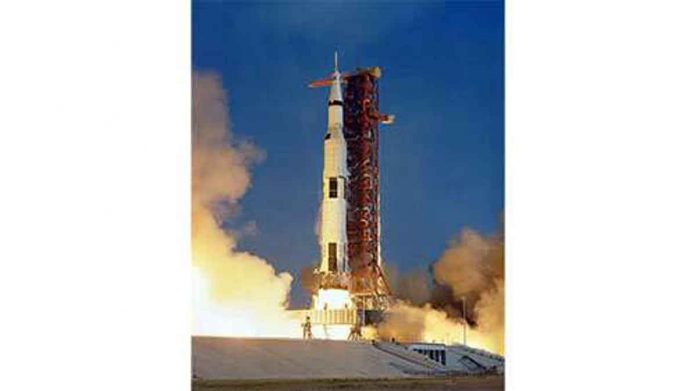The Saturn V, which launched man to the moon, is still the most powerful rocket ever launched into orbit. It captures the imagination—but sometimes a little too much imagination. According to numerous internet claims about the rocket’s acoustic power, it melted concrete and set grass on fire over a mile away.
Such notions are demonstrably false. Researchers from Brigham Young University used a physics-based model to estimate the acoustic levels of the Saturn V in The Journal of the Acoustical Society of America. They obtained a value of 203 decibels, which corresponded to the scant data from the 1960s.
To put that figure into context, commercial jet engines have decibel ratings ranging from 120 to 160.
“Because decibels are logarithmic, every 10 decibels is an order of magnitude increase,” explained BYU author Kent L. Gee. “One hundred and seventy decibels is the equivalent of ten aeroplane engines. Two hundred engines would equal 10,000!”
While the Saturn V was extremely loud, it lacked the power to melt concrete or start grass fires. If these reports are true, they are most likely caused by radiative heating from the plume or debris.
Some of the misunderstandings stems from mixing up sound power and sound pressure. The former is analogous to the wattage of a light bulb. The latter is similar to the brightness of the same bulb: it varies depending on how far away you are. Calculation errors, changes to the decibel reference system, and the spread of misinformation have all contributed to compounding errors.
“The Saturn V has achieved legendary, apocryphal status,” Gee said. “We felt it was an opportunity to correct misinformation about this vehicle as part of the NASA special issue on Education in Acoustics.”
The launch of NASA’s Space Launch System (SLS) Artemis 1 is scheduled for the fall of this year, and it will send humans back to the moon while outperforming the Saturn V in terms of power and noise. The researchers used their framework to predict the sound levels of the SLS, and they plan to take acoustical measurements during the launch to help refine predictions.
To share their findings with college-level physics classrooms, the team also provided educational tools such as homework problems. They hope that the story of this rocket will demonstrate the importance of critically examining data and scientific discussions online.
Kent L. Gee, Logan T. Mathews, Mark C. Anderson, and Grant W. Hart wrote “Saturn-V sound levels: A letter to the Redditor.” On August 23, 2022, the article will be published in The Journal of the Acoustical Society of America.

